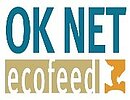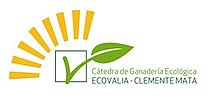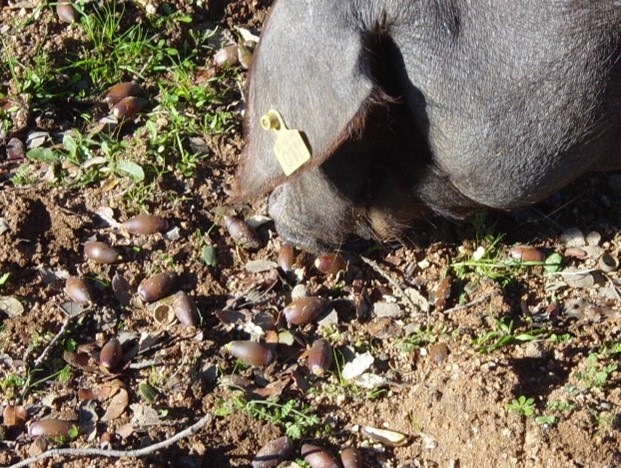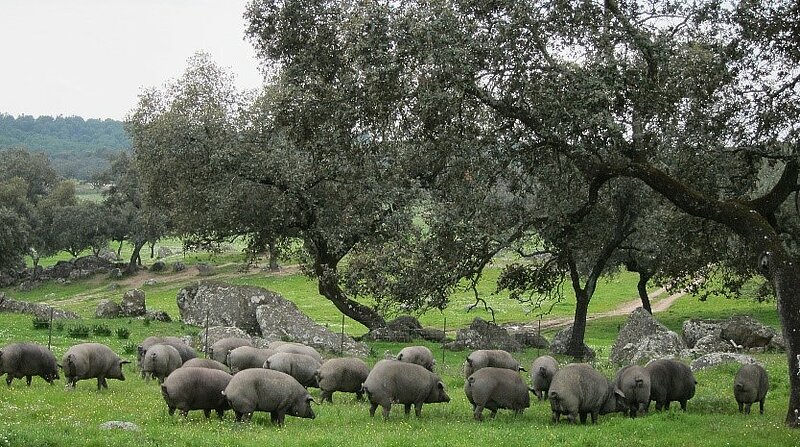Acorns for fattening free-range pigs
Problem
Montanera is a traditional feeding system where pigs forage for acorns. Iberian pigs foraging for acorns during their finishing phase has economically contributed to conserving the “dehesa”, a high nature value (HNV) farm-land based on agroforestry, currently consisting of more than four million hectares in the southwest of the Iberian Peninsula
Solution
This natural resource is used to fatten pigs without any kind of compound or supplementary feed. During the last 2-3 months of fattening, pigs can gain more than 40 kg of body weight from grass and foraged acorns.
Benefits
In the montanera system, the mean average daily gain for fattening pigs is ≥0.75 kg/day. Their body fat has a high concentration of oleic acid (around 55%) and very low concentrations of linoleic and palmitic acids; which is very important for the quality of pork and the cured products.
Applicability box
Geographical coverage
South West of Iberian Peninsula; partly adaptable to other Mediterranean areas and forests with Quercus species (the best species is Q. ilex rotundi-folia).
Application time
Autumn and winter.
Required time
None if there are adult trees; aproximately 15 years to have the first mast of acorns if it is neces-sary to establish trees and the surface is certified as organic.
Period of impact
1.5 months to influence meat quality and fatty acid profile
Equipment
None for free grazing; only a stick to knock down acorns if there is a swineherd with the pigs.
Best in
Fattening pigs (especially in fatty breeds)
Practical Recommendations
- The fattening performance is very much influenced by the age of pigs and their compensatory growth; hence, pigs should be as old as possible (≥1 year) and adapted to grazing.
- Grass is necessary as a source of protein to compensate for the low protein levels in acorns.
- The food conversion rate is 10.5 kg of whole acorns of Q. i. rotundifolia to gain 1 kg, besides the contribution of grass; to establish the stocking rate, consider that an adult evergreen oak produces ≈11 kg of acorns/year).
- Iberian pigs peel acorns to avoid the high content of tannins in the shell. However, during peeling, approximately 20% of the kernel can be wasted.
Further information
Video- The video “Cerdos Comiendo Bellotas en la Dehesa” shows a swineherd knocking down acorns.
- The video “Cerdos ibéricos comiendo bellotas en una dehesa de Extremadura” shows a herd of Iberian pigs foraging acorns.
Reading
- López-Bote, Clemente J. (1998). Sustained utilization of the Iberian pig breed. In: Meat Science, Vol. 49, No. Suppl. I, 2018, pp. l7-27, https://doi.org/10.1016/S0309-1740(98)90036-5
- Rodríguez-Estévez, Vicente et al. (2007). Producción de bellota en la dehesa: factores influyentes. In: Archivos de Zootecnia, Vol.56(R), 2007, pp. 25-43.
- Rodríguez-Estévez, Vicente et al. (2008). Dimensiones y características nutritivas de las bellotas de los Quercus de la dehesa. In: Archivos de Zootecnia, Vol. 57(R), 2008, pp. 1-12.
- Rodríguez-Estévez, Vicente et al. (2009). Intrinsic factors of acorns that influence the efficiency of their consumption by Iberian pigs. In: Livestock Science, Vol.122, 2009, pp. 281–285, https://doi.org/10.1016/j.livsci.2008.09.011
- Rodríguez-Estévez, Vicente et al. (2010). Feed conversion rate and estimated energy balance of free grazing Iberian pigs. In: Livestock Science, Vol.132, 2010, pp. 152–156, https://doi.org/10.1016/j.livsci.2010.05.019
- Rodriguez-Estevez, Vicente et al. (2012). Consumption of Acorns by Finishing Iberian Pigs and Their Function in the Conservation of the Dehesa Agroecosystem. In: Agroforestry for Biodiversity and Ecosystem Services - Science and Practice, Martin Leckson Kaonga, IntechOpen, DOI: 10.5772/34877. Available from: https://www.intechopen.com/books/agroforestry-for-biodiversity-and-ecosystem-services-science-and-practice/consumption-of-acorns-by-finishing-iberian-pigs-and-their-function-in-the-conservation-of-the-dehesa
- Further documents can be found on the Organic Farm Knowledge website.
About this practice abstract and OK-Net EcoFeed
Publishers:Asociación Valor Ecológico – Ecovalia,
ES41013Sevilla,
Phone ,
info@ecovalia.org,
www.ecovalia.orgUniversidad de Córdoba, Campus Universitario de Rabanales, Departa-mento de Producción Animal, Facultad de Veterinaria,
ES14071Córdoba,
Phone ,
,
www.uco.esResearch Institute of Organic Agriculture (FiBL),
CH5070Frick,
Phone +41 62 865 72 72,
info.suisse@fibl.org,
www.fibl.orgIFOAM Organics Europe,
BE1000Brussels,
Phone +32 2 280 12 23,
www.organicseurope.bio,
www.organicseurope.bio
Review: Barbara Früh, FiBL, Switzerland, and Lindsay Whitstance, Organic Re-search Centre, UK
Contact: vrestevez@uco.es
Permalink: https://organic-farmknowledge.org/tool/37476
https://orgprints.org/view/projects/OKNetEcoFeed.html
This practice abstract was elaborated in the Organic Knowledge Network on Monogastric Animal Feed project. The project is running from January 2018 to December 2020. The overall aim of OKNet EcoFeed is to help farmers, breeders and the organic feed processing industry in achieving the goal of 100% use of organic and regional feed for monogastrics.
Project website: https://ok-net-ecofeed.eu/
IFOAM Organics Europe (project coordinator), BE; Aarhus University (ICROFS), DK; Organic Research Centre (ORC), UK; Institut Technique de l'Agriculture Biologique (ITAB), FR; Research Institute of Organic Agriculture (FiBL), CH; Bioland, DE; Associazione Italiana perl'Agricoltura Biologica (AIAB), IT; Donau Soja DS, AT; Swedish University of Agricultural Sciences, SE; ECOVALIA, ES; Soil Association, UK.




This project has received funding from the European Union’s Horizon 2020 research and innovation programme under grant agreement No 773911. This communication only reflects the author’s view. The Research Executive Agency is not responsible for any use that may be made of the information provided. The authors and editors do not assume responsibility or liability for any possible factual inaccuracies or damage resulting from the application of the recommendations in this practice abstract

